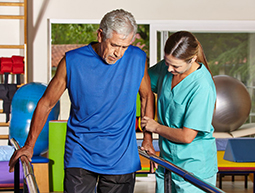Two years ago, at the age of 53, Tim Rowson had a severe stroke that left him lame on his right side, with greatly diminished vision, severe constipation and slurred speech, among other difficult symptoms. Tim was in hospital for three days after his stroke, which was caused by a clot in his neck, and when he returned home he had to begin his rehabilitation therapy immediately.
Confined to a wheelchair, Tim was unable to dress himself or even go to the toilet unassisted, let alone continue running a guesthouse with his partner Mike Upton. A physiotherapist taught Mike how to help with exercises to keep Tim’s joints mobile and strengthen his muscles, so that he could help Tim with his physiotherapy twice a day.
“His exercises include things like bending his leg up to his chest, rotating his ankles and hips, and bridging,” explains Mike. “In the warmer months, Tim does swimming therapy. The winter months are the worst for all the therapies, because we have to be up at 5am to fit everything in before starting work.”
Tackling occupational therapy as part of recovery
“Occupational therapy, or OT, is probably the most important for stroke survivors, as they learn to do things for themselves again,” says Mike. This therapy helps survivors to adapt to the limitations of their body – especially if they’re not going to regain the use of their limbs. “To get an idea of how difficult it is currently for Tim, try opening a bottle with one hand,” suggests Mike.
This form of rehab has helped Tim to regain a lot of his independence with things like dressing, and he has also mastered using a computer with one hand – although using the Shift-key is still a challenge, he says.
“It’s important for stroke survivors to look for any opportunity to practice these OT exercises,” says Mike. One of Tim’s hobbies is gardening, and digging weeds out of the grass with a fork serves as a great exercise for him. He has also become an active – and formidable – Scrabble player, and has tackled more puzzles than he cares to count in order to exercise his fine motor skills.
The value of speech therapy
Speech therapy is Tim’s least favourite rehab activities. “It’s deeply frustrating for him,” says Mike, explaining that the anti-seizure medication that he takes worsens his slur even more. The therapy itself includes exercises to strengthen and mobilise his tongue, and practicing different sounds.
The most important thing, says Mike, is to keep a stroke victim stimulated. “When they’re not stimulated they begin to feel worthless, and there’s the danger of depression,” he says. Luckily for Tim, a busy, active life has kept him from this fallout.
“Tim’s whole life revolves around therapeutic measures,” says Mike, adding that he doesn’t think Tim even notices them anymore as they’re so integrated into his daily life. But the hard work is paying off, and Tim has made steady progress.
Today he’s able to manage their guesthouse’s online booking system and assists with trips to the local grocery store. One day, they hope, Tim’s wheelchair too will be a thing of the past.
How Clicks Clinics can help
Stroke prevention starts with managing your modifiable risk factors, of which high blood pressure (hypertension) is one of the biggest culprits. The Heart and Stroke Foundation South Africa stresses the importance of ‘knowing your numbers’ – that is, finding out your blood pressure, cholesterol, blood glucose and body mass index (BMI). Keeping these within the healthy range will reduce your risk of cardiovascular (heart) disease and stroke.
Clicks Clinics will help you ‘know your numbers’ with their wide range of screening tests. These include:
- Blood Pressure (BP) Test
- Cholesterol Testing and Consultation
- Lipogram Blood Test (to determine different types of cholesterol)
- Clicks Full Basic Screening (BP, Body Mass Index or BMI, meal guide and exercise plan)
- Clicks Screening Measurements only (BP and BMI)
- Clicks Comprehensive Screening (BP, BMI, Glucose and Cholesterol screening, plus meal and exercise plan)
To make an appointment at a Clicks Clinic, call 0860 254 257 or visit Clicks Clinics online.
For more assistance
Heart and Stroke Foundation South Africa – Stroke Support
The Stroke Survivors Foundation
IMAGE CREDIT: 123rf.com

